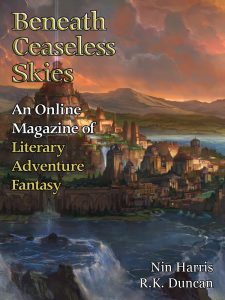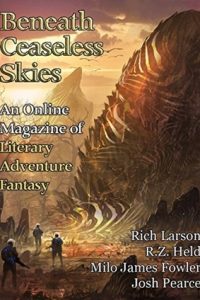Karen Burnham Reviews Short Fiction: BCS, Mithila, Diabolical Plots, and Mad Scientist Journal
 Beneath Ceaseless Skies #273, #274
Beneath Ceaseless Skies #273, #274
Mithila Review #10
Diabolical Plots #47, #48
Mad Scientist Journal Winter 2019
Beneath Ceaseless Skies #273 brings us two coming-of-age stories, although they’re very different. “Through the Doorways, Whiskey Chile” by S.H. Mansouri is told in a twisted landscape of weirdo magic and a moonshiner Whiskey King. Brady Nokes is the king’s son; his Momma died when he was young and his father disappeared. Together with his fire-spouting bullfrong (the narrator of the story), he journeys through a Weird and increasingly grotesque landscape to confront his father figure. In “New Horizons” by Alexander Stanmeyer young Chester is thrust suddenly into a leadership role when the train captain who had rescued him at sea deliberately crashes her train so that Chester can help a group of Outlander children (from a society depicted as a close political analog of American Indian peoples) escape from a life of bondage. In a relatively short story they learn to work together to secure a future for themselves, although I’d say that Chester’s personal journey to grow into a leadership role is somewhat underdeveloped.
Beneath Ceaseless Skies #274 also has a character coming into her power in “I Am Destiny” by Emily McIntyre. Jane is a servant woman who by chance received a huge shot of magical ability that had been meant for the heir to the Duke. She is abused and demeaned for this, but has become resigned to a life where her biggest decision is what to do with her pregnancy, which was likely conceived in rape, though she truly wants the child. When a sorceress invades the Duchy and offers Jane power over the entire region in exchange for her child, Jane is faced with a choice she’d never dreamed of. Her character is sufficiently well developed that such a stark choice and its consequences are not oversimplified.
Issue #10 is the first I’ve read of Mithila Review, “A Journal of International Science Fiction and Fantasy.” The stories here cover a wide range, and I also commend their poetry and non-fiction sections to your attention. Two science fiction stories stood out for me. The first is “Crisis” by Damien Krsteski, which focuses on Nicholas. He is part of an internet-organized group of people who go to places experiencing civil unrest just to experience the high of being part of a passionate mob. Visiting a fictional Slavic country, he chases that euphoria without bothering to learn the language or even what political issues are at the heart of the protests. He is arrested and treated with the contempt he deserves, while counting on the embassy to rescue him. In an age where disaster tourism is a real thing, if people like this don’t already exist it’s only a matter of time.
Next is “Sita’s Descent” by Indrapramit Das. Nanotech advances have allowed India to send a spacecraft to outer space that explores the solar system and returns to Earth to reenact the part of Sita from the Ramayana. Instead it zeroes in on its command base and the surrounding areas, rejecting the tragic mythic role it is supposed to play. Its creator, who’d had doubts about the project from the start, has only minutes to talk to the spacecraft/Sita and change her mind.
Another strong story that seeks to dissect myth is “Lopamudra’s Wedding” by Bhushita Vasistha. Agastya is presented to us as a brilliant mage with his own mythology, which says that when he cannot find a suitable woman to marry to please his ancestors, he makes one himself, and waits for her to grow up to marriageable age in the court of a king. When she comes of age, she visits him and in learned dialog systematically dismembers the story we’ve just been told – as he created her, she is his equal in learning and power, including time travel. The way he’s often left speechless is quite amusing, and the structure of a story being dismantled by one of its own characters is very well done.
I went back to catch some of the stories from winter’s Diabolical Plots, and the ones I saw leaned towards the quietly surreal end of the spectrum. “The Divided Island” by Rhys Hughes is a classic thought experiment about an island divided strictly into societies of order and chaos, each with enclaves of the other within itself. A downed pilot is our guide, trying to navigate the landscape and never sure where they stand. “The Dictionary for Dreamers” by Cislyn Smith was my favorite, a story told through the word usage examples in dictionary entries. It reads very poetically, and, just like a dream, certain threads and motifs drift around and almost coalesce but never quite resolve. I also enjoyed “Local Senior Celebrates Milestone” by Matthew Claxton, in which a woman turning 110 gives anodyne answers to a local reporter’s predictable questions, but thinks to herself what the much more interesting real answers would be, considering she is not the elderly human woman she appears to be.
The Mad Scientist Journal is a venue that can only be described as “quirky,” and it has plenty to entertain. Envisioned from start to finish as a journal for all those mad scientists out there, its best stories generally come in the “Essays” section. There are some great conceits here; one of my favorites is the idea that those adorably indestructible tardigrades (water bears) are an advanced scouting force for much larger and meaner cousins with planet conquering ambitions (“Sacrifice” by Annika Sundberg). There are lots of would-be Frankensteins out there, from a freelance necromodder whose down-and-out brother keeps asking for improvements (“The Parts of Him I Can Help With” by Gordon B. White), to an EMT who spends years trying to piece together a corpse and possibly deluding himself about his own powers (“Or, the Modern Levitation of Frankenstein” by Ron Riekki). There are cyborgs, escaped experimental subjects, product reviews, and views on climate change even more deluded than those found in the halls of Congress, all of it in good fun. I especially want to highlight an alternate-history piece by Fiona Moore: “Every Little Star” imagines an alternate timeline of space travel where Ludmilla Kovalenko was the first human launched into space (but not successfully returned). She inspired breakthroughs in both technology and the gender barrier, and Captain Evangeline Artemisia Quelch (Artie) is a former space pilot now commanding a moon base, although she still has to deal with the condescendingly sexist press. Her heroic exploits have left her with lingering claustrophobia, and she is now somewhat uneasily settled into a desk job; a friend’s invention of a kind of rudimentary VR reopens her horizons. It’s a great story, well thought out and well dramatized.
Recommended Reading
“I Am Destiny”, Emily McIntyre (Beneath Ceaseless Skies #274)
“Every Little Star”, Fiona Moore (Mad Scientist’s Journal Winter 2019)
“The Dictionary for Dreamers”, Cislyn Smith (Diabolical Plots #47)
Karen Burnham is an electromagnetics engineer by way of vocation, and a book reviewer/critic by way of avocation. She has worked on NASA projects including the Dream Chaser spacecraft and currently works in the automotive industry in Michigan. She has reviewed for venues such as Locus Magazine, NYRSF, Strange Horizons, SFSignal.com, and Cascadia Subduction Zone. She has produced podcasts for Locusmag.com and SFSignal.com, especially SF Crossing the Gulf with Karen Lord. Her book on Greg Egan came out from University of Illinois Press in 2014, and she has twice been nominated in the Best Non Fiction category of the British SF Awards.
This review and more like it in the May 2019 issue of Locus.
 While you are here, please take a moment to support Locus with a one-time or recurring donation. We rely on reader donations to keep the magazine and site going, and would like to keep the site paywall free, but WE NEED YOUR FINANCIAL SUPPORT to continue quality coverage of the science fiction and fantasy field.
While you are here, please take a moment to support Locus with a one-time or recurring donation. We rely on reader donations to keep the magazine and site going, and would like to keep the site paywall free, but WE NEED YOUR FINANCIAL SUPPORT to continue quality coverage of the science fiction and fantasy field.





